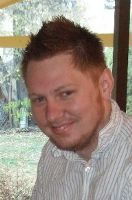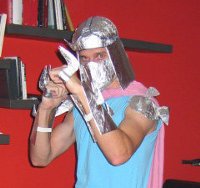Meet Tim Penhey
Wednesday, February 25th, 2009 We’re back in New Zealand for today’s Launchpad developer interview with Tim Penhey.
We’re back in New Zealand for today’s Launchpad developer interview with Tim Penhey.
Matthew: What do you do on the Launchpad team?
Tim: I lead the team that works on the Bazaar code-hosting side of Launchpad. This includes all the pages that are under the “Code” tab, the linking of branches to other parts of the Launchpad system, the services and scripts behind the scenes that allow the hosting of branches, and the branch browser (Loggerhead).
Matthew: Can we see something in Launchpad that you’ve worked on?
Tim: I’ve touched probably every page visible under the “Code” tab. A large amount of work is going into the work flows around code reviews, and that is where I’ve been spending a lot of time recently.
Matthew: Where do you work?
Tim: I work from home, and home for me is currently Dunedin, New Zealand. I turned one of the bedrooms in the house into an office, which contains my desk, a nice comfortable leather chair, and too much computer equipment.
Matthew: What can you see from your office window?
Tim: Our deck, and beyond that our back yard which is mostly grass with a trampoline for the girls and part of the garden which currently has several pumpkin plants doing extremely well.
Matthew: What did you do before working at Canonical?
Tim: I worked as a contract developer in London, UK. I primarily worked at investment banks working on their back office risk systems. I had worked for Lehman Brothers (RIP), Royal Bank of Scotland, Barclays Capital, and Cantor Fitzgerald. Prior to that I had a stint at Reuters working on their stock exchange connectivity software.
Matthew: How did you get into free software?
Tim: Sometimes I wonder if I am “into” free software. As far as using free software, I’ve had an aversion to paying for Microsoft software when perfectly good free alternatives were around for a while. I toyed with Linux a couple of times back with Red Had 7.1, and some SUSE version shortly after that, but I didn’t make the switch until I came across the Hoary Hedgehog release candidate. I’ve been using Ubuntu since then.
I’ve been meaning to get into actually contributing to free software for so long. Every time I looked into it I got put off by the massive leaps into a group’s culture and code base. I use KDE and have it as my main desktop almost exclusively, and I’d love to contribute to KDE, but it seems that there are always the “KDE” or “QT” ways of doing things. I had a background in C++, but they don’t use what I’d consider “pure” C++, so there is always a huge learning curve, and I don’t have the time right now to invest in that. I have a three girls, 8, 6, and 3 and a half (don’t forget the half), and they take up a lot of my non-work time. I’ve had the opportunity to contribute a few small patches to Bazaar, and I’d still like to contribute to other projects.
Matthew: What’s more important? Principle or pragmatism?
Tim: That’s like saying: What is more important? Food or water? They are both important. Particularly when developing code if you don’t have one tempered
with the other you end up unreadable spaghetti or gold plated code. I lean towards more principle as it tends to give cleaner code, but sometimes pragmatism wins out to actually get code out and useful. Code that isn’t used might as well not be written.
Matthew: Do you/have you contribute(d) to any free software projects?
Tim: I’ve got a couple of small patches into Bazaar. I use aliases a lot with bash, and also with Bazaar, but didn’t like that I had to edit the configuration file to add aliases, so scratching my own itch, I added the ‘alias’ command to Bazaar. I’ve also done some work on the PQM project, but most of my work is on Launchpad.
Matthew: Tell us something really cool about Launchpad that not enough people know about.
Tim: Code reviews. We are actively working to make them better, but the coolest thing about code reviews in Launchpad, is that you can do them entirely through email. Not only can you go to the web page and add a comment, and that comment gets emailed out to all interested parties, but you can reply to the emails using your mail client, and those replies are parsed, added to the review, and emailed out to the interested parties just as if you had entered them through the web interface.
A lot of work has also gone in recently to expose the code review functionality through launchpadlib as well. This will allow people to integrate Launchpad’s review functionality into other tools.
Matthew: Is the film Eagle v Shark an accurate picture of life in New Zealand?
Tim: To be honest, I have no idea as I haven’t seen the film. It has been on my list of something to get on DVD at some stage, but I don’t have it yet.
Matthew: Okay, Kiko‘s special question! You’re at your computer, you reach for your wallet: what are you most likely to be doing?
Tim: Getting my credit card to pay for books from Amazon. Books are very expensive in NZ. On my coffee scale, it is almost twice as expensive as the UK. Three coffees in the UK for a paperback, whereas it is closer to five or six coffees in NZ.
Matthew: Thanks Tim!


 Today it’s
Today it’s 
 Next in the chair for our
Next in the chair for our  Jonathan Lange
Jonathan Lange




